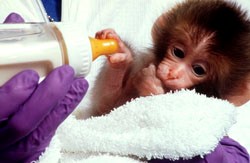Caring for Our Animals

The Oregon National Primate Research Center's (ONPRC's) contributions to biomedical research rely on scientific integrity, a commitment to innovative research, and ultimately a fundamental respect for life. Our animals are crucial to discovering more effective and accessible vaccines, treatments, and cures for a myriad of devastating human and animal diseases. We recognize the ethical questions raised by animal research, which is why we provide humane and compassionate animal care while conserving our resources for only the most essential research endeavors.
The Division of Comparative Medicine is responsible for all aspects of animal care and is committed to preserving the health and welfare of ONPRC's nonhuman primates (NHPs). Our dedicated staff members provide veterinary care twenty-four hours a day, seven days a week, 365 days a year; ensure our NHPs are provided nutritionally balanced meals, daily fresh produce, and behavioral enrichment activities; and maintain clean, safe environments. We maintain one of the largest specific pathogen-free colonies of rhesus macaques in the country.
ONPRC's adherence to stringent state and federal regulations is strengthened by its independent internal and external oversight. The Center is inspected biannually by the United States Department of Agriculture (USDA), and provides annual reports to the National Institute of Health via the Office of Laboratory Animal Welfare. ONPRC is particularly proud of the fact that it has maintained accreditation for more than 48 consecutive years by AALAC, International (AAALACi). AAALACi, is a voluntary inspection and accreditation program that promotes standards which often exceed government regulatory requirements.
Our monkeys
The Oregon National Primate Research Center (ONPRC) is home to approximately 5,000 nonhuman primates (NHPs), including a variety of macaques (Rhesus, Japanese, and Cynomolgus) and a small number of baboons and squirrel monkeys. The vast majority of our NHPs are rhesus macaques.
The founding troop of rhesus macaques, whose natural range is from northern India to northern China, was brought to Brown University in the 1950's and transferred to Oregon in 1964.It is no exaggeration to say they are essential to our ability to find cures for cancer, AIDS, Alzheimer’s, Parkinson’s, obesity/diabetes, and dozens of other diseases that cause human suffering and death.
In 1964, the government of Japan donated a troop of 46 Japanese macaques to the Center for conservation purposes—they were threatened by deforestation and by farmers who treated them as pests—so that scientists could study their behavior and social organization. The colony is also an irreplaceable reservoir of natural models relevant to research in multiple sclerosis, age-related macular degeneration, and Batten disease.
ONPRC also has baboons which are part of a contraceptive development program, or a heart disease study focusing on hemostasis and blood coagulation mechanisms. A small number of squirrel monkeys are also housed on site and utilized for Malaria studies.
Frequently Asked Questions
The vast majority of our nonhuman primate population is housed in large, outdoor enclosures in groups of approximately 30-150 or more monkeys. The Center pioneered social housing of nonhuman primates in the 1970s when it constructed several 1-2 acre, outdoor corrals. Today, we have 8 such corrals and over 50 smaller enclosures.
Other monkeys live indoors, either in small pens of 3-10 or so individuals or in cages. Cages can connect so that two or more compatible monkeys can live together in two or more cages, to which they all have full access. The ONPRC is committed to socially housing all nonhuman primates unless prohibited by medical concerns or research requirements. All nonhuman primates are housed in visual and auditory contact with other nonhuman primates.
We currently house about 5,000 nonhuman primates at the ONPRC, the majority of which are rhesus macaques. We also house approximately 300 Japanese macaques and small numbers of other species (cynomolgus macaques, squirrel monkeys and baboons).
An outdoor breeding program ensures that the Oregon National Primate Research Center's nonhuman primate population is nearly self-sustaining. The original colony of rhesus macaques, numbering approximately 400, came from India. Today, monkeys not bred at the Center are acquired from other primate facilities in the US.
Division of Comparative Medicine veterinarians, veterinary technical staff, behavioral staff, animal care technicians, laboratory staff, and administrative support staff are collectively responsible for the physical care and psychological well-being of the NHPs.
Because the Oregon National Primate Research Center's nonhuman primates are kept in excellent health, receive regular veterinary care, and enjoy balanced nutrition, they live, on average, significantly longer than their "wild" counterparts in India and China. In addition, there is a focused program to promote their psychological well-being. Surgical and any potentially painful procedures are performed under the same anesthetic and aseptic conditions as human surgery.
Research involving animals is highly regulated; therefore, ONPRC receives external oversight from multiple regulatory and accrediting agencies, and internal oversight from multiple committees required in regulatory documents.
Yes! See our Tour page for details. In an effort to protect the monkeys from infection or other potential illnesses which may be transmitted by humans, access is limited.